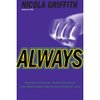She Kicks Ass & You’ll Like It: Nicola Griffith’s Always
So, the official word is out that I nominated Nicola Griffith’s Always for the summer round of the LitBlog Co-Op, and I’m going to do my best to try and convince you to read it NOW so you can hop over and participate in the discussion later on. I’ve only been a nominator once before (I chose Jeff Ford’s The Girl in the Glass), and making a choice wasn’t tough at all that time either. This time around, I’d planned on choosing Ysabeau’s Flora Segunda, but then it was getting all sorts of love from the New York Times and, well basically, everywhere, and began to be not overlooked enough (which is a good thing). Griffith’s new novel landed in my lap and I devoured it immediately, loved it, and had a couple of days to make a pick. The choice was clear. (And isn’t it interesting that both of my picks to date have been mystery/suspense? Clearly, I need to be reading more of the stuff.)
Now, I hope this book turns out not to be overlooked too. I hope it is the one which finally gets the attention and buzz and READERS it deserves, but I strongly feel that Griffith’s work–and the Aud novels in particular–deserve more readers. They get pigeonholed, I think, for some interesting reasons.
I should start over a bit and say that if you haven’t read the earlier Aud novels The Blue Place and Stay, then you’re in for a treat, but you don’t have to have done so to read this one. (At least, that’s my take — I suppose the LBCers will get to weigh in on that one, since I imagine most of them haven’t read the earlier books.) Aud is Aud Torvingen, an uber-rich, uber-competent, uber-striking Norwegian expatriate who’s been living in Atlanta (where one of Always’ dual storylines is set) for years. She’s an ex-cop. She knows a bunch of different ways to kill you with her hands. She’s so in her head that she sometimes has trouble being in her heart. But her heart has funny ways of getting around that and when she feels and when she is smashed? It hurts oh so much more.
She is, basically, a larger-than-life noir heroine. No one would bat an eyelash at this character if she were a man, I don’t think (based on James Bond, the Bourne dude, and a half dozen other examples), but I’m really curious to see how the other members of the LBC react to her. There are tons of kick-ass and ass-kicking female characters being written today, but I’m hard-pressed to come up with one exactly like Aud. Again, uber. Uber-everything. And fascinatingly complex. One of the key differences between Aud and the typical male larger-than-life thriller hero is the depth at which we get to look at her insides–those characters tend to be ciphers, the reasons they are what they are often too thin to stand up to scrutiny. And they very rarely change. Aud isn’t a cipher and she is constantly growing, changing, learning while still being completely consistent as a character, both of which are tributes to Griffith’s fine, fine writing.
The other reason I think these books haven’t busted out completely is that Aud is a lesbian and sometimes she falls in love. This new book is part love story. Yes, there is hot girl-on-girl action. (Please, shoot the person who ever came up with that term.) And so maybe this is one of those books that gets embraced by the gay community, but which doesn’t get picked up by the average thriller reader. I suspect this is a factor. It’s a silly factor, but nonetheless. (My recent conversations with gay/lesbian publishing types back this impression up too.)
So, anyway, these are awesome, weighty page-turners–they completely earn that elusive "meaning of life thriller" (to steal Sean Stewart’s term again) designation. These are big, ass-kicking, kick-ass books. Give Always a shot and see if you don’t agree.
I’ll have much, much more to say on the beauty that is Always later this summer. You should too.
See also: Griffith’s Web site
She Kicks Ass & You’ll Like It: Nicola Griffith’s Always Read More »
